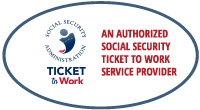Frequently Asked Questions
Do I have to pay to participate in the Ticket to Work Program?
Nope! The Ticket to Work Program is free and voluntary for anyone receiving SSDI. The Ticket Program provides you with vocational services and support at no cost to you. Social Security pays the Employment Network you choose as you achieve certain milestones and outcomes associated with work and earnings.
Can I participate in Ticket to Work and still get services from my State Vocational Rehabilitation (VR) agency?
Varies by state, but often yes. State VR agencies provide a large variety of services to help people with disabilities return to work, enter new careers, or enter the workforce for the first time. In most states, you do not lose access to these services when entering the Ticket program.
What are Work Incentives?
Work Incentives are disability program rules that allow you to reduce your countable income so that you can continue to receive a cash benefit while you explore work or look for a job that is right for you. Examples of Work Incentives include the extension of Medicare and Medicaid coverage while working, impairment-related work expenses, and Plans for Achieving Self-Support.
Will I lose my Medicare and/or Medicaid if I get a job?
As long as you keep receiving a benefit check of any amount, you will keep your health insurance. If you earn enough that your SSDI checks stop, Medicare can continue for up to 93 months.
If you currently receive Medicaid, you should be eligible to continue receiving Medicaid even after you stop receiving Supplemental Security Income (SSI) benefits due to work. To be eligible you need to meet certain requirements, which include earnings below a threshold amount set by your state. Even if your earnings exceed the state threshold, you may still be eligible and should talk to your state Medicaid office.
*Varies by state.
If I enter the Ticket to Work program, will Social Security conduct a medical review of my case and take away my benefits?
Social Security does review your medical condition from time to time to see if you’re still disabled, using a process called the medical Continuing Disability Review, or medical CDR.
If you participate in the Ticket program with either an Employment Network or your State Vocational Rehabilitation Agency, and make “timely progress” following your individual work plan, Social Security will not conduct a review of your medical condition.
If a medical CDR has already been scheduled for you before you assigned your ticket, Social Security will continue with the medical CDR.
How do I put my Ticket into “Inactive Status?”
A beneficiary may have his or her Ticket placed into “Inactive Status” at any time by submitting a written request to Social Security. Inactive Status will begin on the first day of the month following the month your request is received.
Remember, once your Ticket is inactive, you will no longer be protected from medical Continuing Disability Reviews and Social Security can review your file during those months your Ticket is inactive if you are due for a medical Continuing Disability Review.
If I stop receiving SSDI checks due to my job, and I have to stop working because of my disability, will I have to reapply for benefits all over again?
Absolutely not. You will not need to reapply if your benefits ended within the past five years due to your earnings and you meet a few other requirements, including that you still have the original medical condition or one related to it that prevents you from working. This is a work incentive called Expedited Reinstatement.
You may even be able to receive up to six months of temporary cash benefits in addition to Medicare or Medicaid coverage while SSA conducts a medical review to determine if your benefits can be reinstated.
What is “Timely Progress?”
The Social Security Administration (SSA) cannot perform a medical Continuing Disability Review (CDR) while you are actively participating in the Ticket to Work Program and making progress toward your employment goals. This important protection is maintained through a process called Timely Progress Review (TPR).
Approximately every 12 months after you assign your Ticket to an Employment Network like Employment Resources Inc., the SSA evaluates whether you are making the expected progress toward your vocational goals. The administration looks at specific achievements such as:
- Completing certain educational milestones
- Participating in vocational training programs
- Getting and maintaining employment
- Increasing earnings over time
- Meeting other personalized benchmarks in your employment plan
This regular assessment is known as a “Timely Progress Review.” Successfully meeting these progress requirements ensures your continued protection from medical CDRs while you work toward greater financial independence.
Our team at Employment Resources Inc. works closely with you throughout this process, helping you understand the requirements, document your progress appropriately, and maintain your CDR protection while pursuing your employment goals.
Can I use a Ticket to become self-employed or start my own business?
Certainly! If you’re interested in pursuing a self-employment goal, let your Employment Network know early in the process. Be aware, however, that ENs are not required to accept all Ticket assignments and they may not elect to work on a self-employment case.
What is the Student Earned Income Exclusion?
This provision allows a person who is under age 22 and regularly attending school to exclude earnings from income.
In 2022, the Student Earned Income Exclusion increased by 5.9% to $2,040 per month, but not more than $8,230 for the year.
Who is eligible for the Student Earned Income Exclusion?
Anyone who is under the age of 22 and a student regularly attending school, college, or training to prepare for a paying job.
What does “regularly attending school” mean?
Regular attendance means taking one or more courses of study and attending classes:
- 12 hours a week in grades 7-12.
- 8 hours a week in a college or university.
- In a course of training to prepare for a paying job for at least 15 hours a week if the course involves shop practice or 12 hours a week if it does not involve shop practice. This includes anti-poverty programs such as the Job Corps and government-supported courses in self-improvement.
- Home school education in accordance with the home school law of the state or other jurisdiction in which a person resides.
A person who is homebound because of a disability may be a student when he or she:
- Studies a course or courses given by a school (grades 7-12), college, university, or government agency; and
- Has a home visitor or tutor from school who directs the studying or training.
What is a Plan for Achieving Self-Support?
PASS is a Supplemental Security Income (SSI) work incentive that allows a person with a disability to set aside income and/or resources for a specific period of time to achieve a work goal. For example, a person may set aside income and/or resources for obtaining an education, job coaching, or other support services, transportation, job-related items, or equipment to start a business.
Important Note: The PASS program application and approval process is handled directly with Social Security PASS specialists, not through Employment Resources Inc. or any Employment Network. While we can provide general information about the PASS program as part of our benefits counseling services, individuals interested in developing a PASS plan must work directly with SSA’s designated PASS specialists for application submission and approval.
We can help you understand how a PASS plan might fit into your overall employment strategy and refer you to appropriate resources at the Social Security Administration for next steps.
Who qualifies for a PASS?
Anyone who receives SSI benefits or Social Security Disability Insurance (SSOI) and could qualify for SSI can have a PASS plan.
You must be under the age of 65, meet SSA’s satisfaction of disability or blindness, meet all SSI eligibility criteria with the exception of the income and resources test, and have earnings, unearned income, deemed income, in-kind support, or resources to set aside in the PASS.




